
Building Business: Harvest Moon Farms
Cape Cod Garden / GARDEN Annual 2021 / Home, Garden & Design
Writer: Chris White / Photographer: Mike Crane
Building Business: Harvest Moon Farms

Cape Cod Garden / GARDEN Annual 2021 / Home, Garden & Design
Writer: Chris White / Photographer: Mike Crane
Dancin’ in the Light
The first season at West Barnstable’s Harvest Moon Farms yields a bounty of certified organic produce for online customers.
In the pantheon of rock-n-roll deities, Neil Young is the god of farming and farmers. Not only did he co-found, along with Willie Nelson and John Mellencamp, the now-annual fundraising concert Farm Aid, his songs roll like golden waves in sparse, stripped down chords of everything from folk to country to grunge, awash with imagery of self-reliance, freedom, and love of the land. From his iconic 1972 album, “Harvest,” in which he asks, “Will I see you give more than I can take? Will I only harvest some?” to his “modern” classic sequel released 20 years later, “Harvest Moon,” he has captured rural life—and the nostalgia for it—like only a few others have done. In the title song of the 1992 release, Neil croons “Because I’m still in love with you, I want to see you dance again. Because I’m still in love with you, on this harvest moon.”
It’s funny sometimes how a simple act of naming can take on more meaning. Edwin and Christine Ordway, the owners of a new organic farm on Route 6A in the Cape village of West Barnstable, alighted on the name of their enterprise almost by chance. “It’s not an original name,” says Ed. “My wife and I were spitballing names, and Christine suggested Harvest Moon because I am a Neil Young fan.” The name stuck, and in the process, it captures the Ordways’ situation metaphorically.
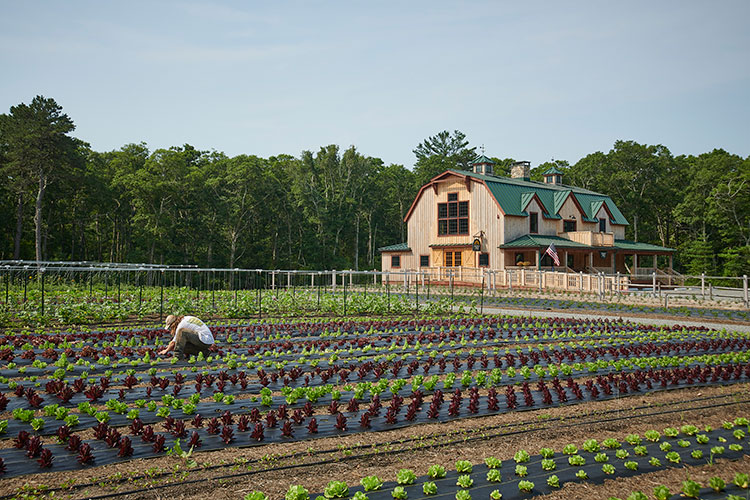
Like the couple in the song, Ed and Christine are dancing again—figuratively, anyway—as they are entering a new phase of their lives together. Having retired from careers in finance, accounting, and marketing, they’ve chosen to “go out and feel the night.” And the last couple of years have been something like a time of moons waxing as the Ordways applied for various permits, awaited approval from the Massachusetts Department of Transportation (because of the farm’s location on the state highway Route 6A), looked on as their sprawling acreage was transformed, and literally watched the farm grow up from foundations, frames, dirt, and seeds into a fully operational organic farm that opened on July 1st of this year. It’s too bad that the actual moon refused to cooperate with the timing, but it bathed the strawberries, marigolds, herbs, lettuces and other vegetables soon enough.
While Ed loves the music of Neil Young, he says, “I don’t follow him around like people do with the Grateful Dead, but I’ve seen him quite a few times. I really enjoy seeing concerts.” Just as Ed’s history with music runs deep, so too does his connection to farming, and the conception of the philosophy behind Harvest Moon Farms. When he was growing up in New Jersey, he worked in a garden store in the summer from ages 16 to 19, and he handled a lot of produce during that time. He also bore witness to the established farming practices of the day.
“They were spraying pesticides all over everything then; it was just the way we farmed 40 years ago,” he says. Harvest Moon Farms, in a sense, represents a second youth for Ed, and it’s a way to set things right in terms of agriculture on a small, local scale. It is, among other things, “Cape Cod’s first USDA certified organic online farmstand.” It’s also a way of conserving a piece of the remaining land in the area. Although the Ordways’ land measures 15 acres, seven are conserved by the Barnstable Land Trust, while the farm occupies the remaining eight.
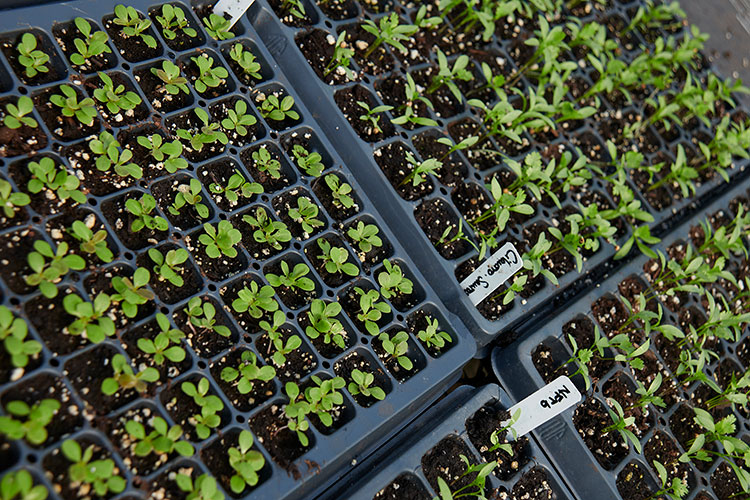
“It’s not the best ‘financial’ use of the land,” Ordway says. “That would be to turn it into single family homes.” That could be part of the reason why there are relatively few small family farms remaining on the Cape. “There’s no reason why we can’t have more of these,” he says, “except that through creeping normalcy, real estate has become too valuable.”
The farm employs eight full-time and two part-time workers, and they have been using a service through Tend.com to help organize the planting and layout. “It’s a software program for small farms,” explains Ed. “You input the crops and the geography—each bed is numbered—and it tells you how to space and seed and predicts the yield.”
The Harvest Moon Farms philosophy essentially boils down to producing the best food while maintaining, Ed says, “as light a carbon footprint as possible.” The farm does rely, like the actual moon, on sunlight for power. “I’m a regulated utility because of the 60 panels on the south-facing roof of the barn,” Ed says. “We worked with Cotuit Solar, who were very good about getting us through the regulatory red tape and obtaining incentives through the state.”
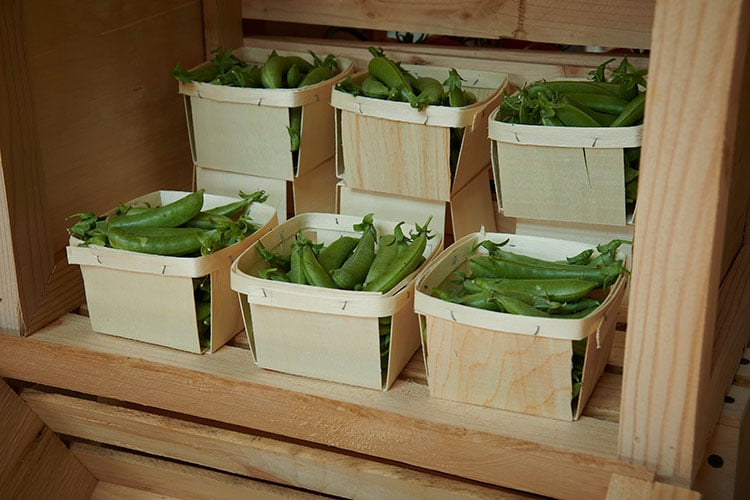
The farm also installed a drip irrigation system, which uses 30% – 50% less water than overhead sprinklers, and the vegetable beds are permanent, and “no-till.” In an environmentally sensitive move, Ed explains that “We’re not plowing, or turning the soil over. We do use a machine to stir the soil and to add compost.” Constant rototilling can negatively impact the life of soil and can lead to an increase in weeds when unwanted seeds are turned over and given more access to sunlight and water. According to the Harvest Moon Farms website, “By limiting any disturbance to the soil, microbial soil activity, vitally important for soil health, will flourish.”
As a New England environment, the Cape has a relatively long growing season, but the first couple of years will be experimental at Harvest Moon. “We’re trying to grow everything with the full knowledge that some things are just not suitable for this climate,” says Ed. “We’ll see what grows best, but this year, we’re planting 70 different vegetables, including eight different lettuces.” Harvest Moon will also grow strawberries, blackberries, raspberries, cantaloupe, and watermelon. They’ve also planted apple trees, but it will take a few years for these to bear fruit. Ed points out that they’re currently “training” the apple saplings to “espalier,” or grow flat, against the rock wall that forms the border between the driveway and some of the vegetable beds. Likewise, trelicing has been built for the raspberry bushes.
Even though the farm is surrounded by forest, wildlife pests have not yet caused problems. “We’ve been fortunate,” Ed notes. “We have not had much of an issue with rabbits, turkeys, or deer. I did see a healthy looking coyote the other day, so maybe they are helping out.” Harvest Moon has also constructed and positioned owl boxes and bat houses at strategic points around the property. “The bats control insects big time; they eat a boatload of bugs, especially mosquitos,” says Ed. No owls have taken up roost yet, but Ed remains hopeful.
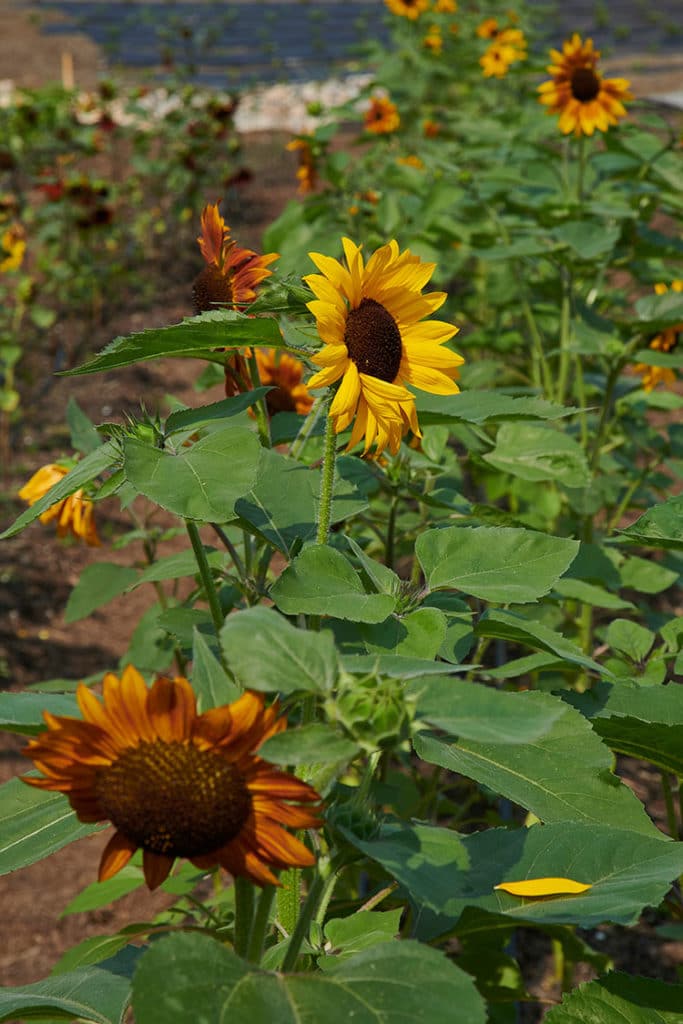
Harvest Moon Farms is open to the public from Thursday through Saturday every week. Customers can also order their produce online and then come to the barn to pick up on an appointed day. “We wanted to avoid a 7-day retail operation,” Ed explains, “so on Mondays, we figure out what inventory will be available, and then we harvest on Tuesday, Wednesday, and Thursday. Customers should get their orders in by Thursday for Friday, or Saturday, pickup.” By restricting the hours and establishing the online pre-order system, Harvest Moon can be more precise about its produce and minimize waste. The barn contains both the retail shop and a work area with a walk-in refrigerator and stations for packing the produce. The entire operation is very precise from the planning, to the seedlings in the greenhouse, to the time of harvest, and the amount of preparation appropriate for each type of plant.
“As soon as you pick something,” Ed notes, “it begins to lose its freshness.” Through the systems in place at Harvest Moon Farms, customers can know they are buying some of the freshest, most nutrient rich produce available. “Opening day on July 1st went pretty well,” says Ed. “There’s been more and more interest as people have seen the farm growing. We also sent out a mailer and advertized in “Edible Cape Cod.” And Route 6A is a pretty busy road.”
In the upcoming months, Harvest Moon Farms will install its own compost operation, using the Paragon O2Compost system, which accelerates the process by pumping in air. Nauset Disposal has offered to deliver food waste, and Ed has made arrangements with some horse farms that will allow the farm to add manure to the compost. By November, two additional greenhouses should be installed, which will help set up operations for the 2022 growing season.
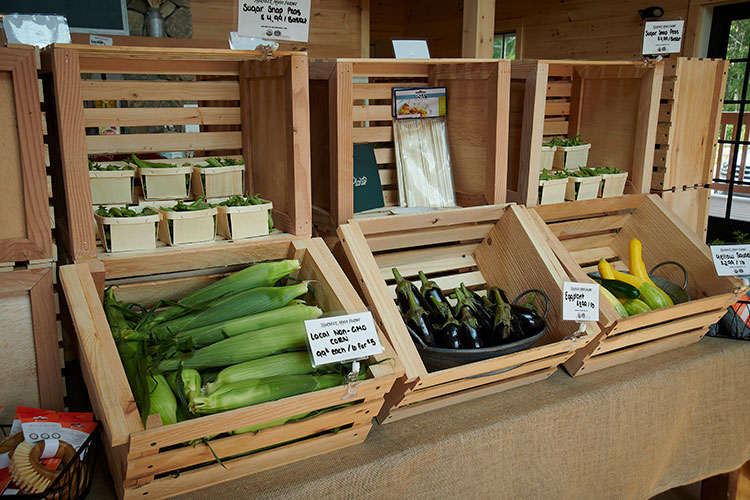
Over the upcoming months, customers will be able to visit the website, choose from a wide variety of flowers, vegetables, and fruit, and see everything growing as they drive in to pick up their bounty from the barn. Harvest Moon Farms t-shirts and other branded merchandise are also for sale, along with a variety of products from small businesses and other folks who are making a go of it with jams, jellies, sauces, and the like.
And of course, Neil Young is present in a collection of great photos that Ed took at concerts. August and September were peak months at Harvest Moon Farms, and they’ll still have offerings through mid-November. So if you’ve never had Hakurei turnips, or Salanova red butter lettuce, or if you just have a craving for fresh berries, or a beautiful vase full of locally grown flowers, go to harvestmoonfarms.net and then come on down to the barn. As Neil says, “there’s a full moon risin’; let’s go dancin’ in the light.”
Harvest Moon Farms is located at 2199 Main Street, West Barnstable, harvestmoonfarms.net.
Chris White is a contributing writer for Cape Cod Life Publications.



